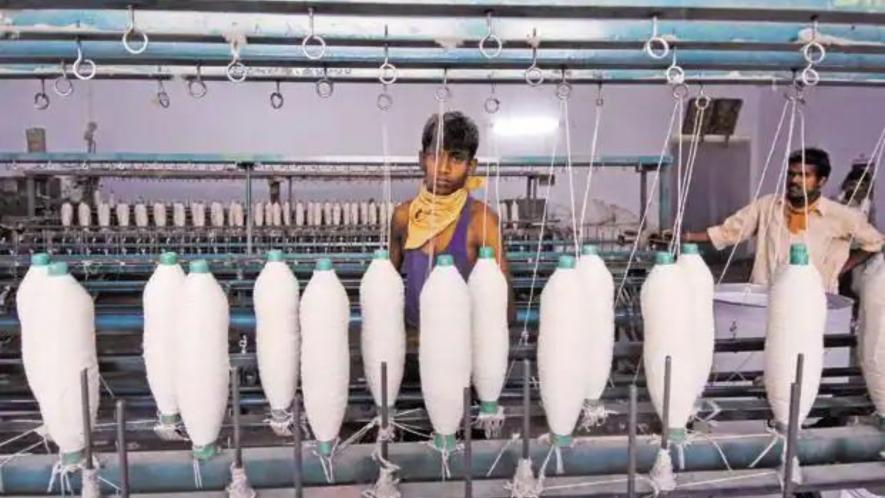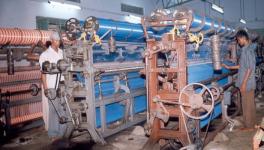Tamil Nadu Spinning Mills Strike as raw Materials Turn Costlier, Yarn Gets Cheaper

Representational Image. Image Courtesy: PTI
Open-end (OE) spinning mills around western Tamil Nadu’s Tirupur and Coimbatore are unable to withstand the rising cost of raw material, decreasing yarn price and market slowdown. Urging the government to control the prices, more than 600 spinning mills halted production on Tuesday till November 30.
The Open End Spinning Mill Association (OSMA) has also demanded an immediate reduction in electricity tariff, hiked in September. MSMEs had also opposed the new tariff.
OSMA president G Arulmozhi told NewsClick that “open-end mills procure cotton waste from spinning mills to produce 25 lakh kg of grey cotton yarn”.
“We produce 15 lakh kg of coloured cotton yarn daily using plastic PET bottle fibre and post-garment cutting wastes. We send these to power loom and handloom units in the state, who manufacture products like bedsheets, lungis and towels.”
Everyday, one crore metre of grey cotton yarn is produced by OE mills. The strike will result in production loss of Rs 1,000 crore and no wages for workers.
INCREASE IN PRODUCTION COST
The prices of grey cotton yarn and coloured cotton yarn have shot up.
“The cost of one kg of cotton is Rs 160. Based on this, the cost of waste cotton should have been Rs 97 per kg, not Rs 115,” Arulmozhi said.
“The cost of electricity and raw materials has increased manifold in the last five years. If the government does not reduce the electricity tariff, the textile industry will close down,” he added.
OSMA demanded that the Centre immediately stop cotton waste export to control the price of raw material. The Association has also demanded the scrapping of the 11% tax levied on cotton import, which affects OE mills, and relaxation in quality-control norms for synthetic fibres.
“More than 600 open-end spinning mills produce yarn worth Rs 60 crore daily. For the last six months, only 50% of the mills are operational,” Arulmozhi said.
“We stopped production as there will be losses if we continue to run the mills. Thirty mills have already stopped production.”
OE spinning mills provides 30% of the yarn used in textile production in Tamil Nadu.
After several rounds of talks, mill owners decided to halt production. They had already sent most workers to their hometowns and reduced production by half before halting it completely.
UNABLE TO COMPETE IN MARKET
Many states like Maharashtra, Gujarat, Haryana, Bihar and Punjab have announced new textile policies and give 50% subsidy to textile mills. Tamil Nadu mills are unable to compete with other states due to the lack of incentives and unable to produce clothes at low cost.
Arulmozhi pointed that OE mills in Panipat, Haryana, sell yarn at 30% lower prices compared to those in Tamil Nadu.
OE yarn manufacturers also claim that textile production is affected due to the inability of exporting goods. Domestic textile production has been affected as fabric is produced and sold at low prices compared to rival countries like Bangladesh and Vietnam.
Get the latest reports & analysis with people's perspective on Protests, movements & deep analytical videos, discussions of the current affairs in your Telegram app. Subscribe to NewsClick's Telegram channel & get Real-Time updates on stories, as they get published on our website.
























